Real estate video pricing varies due to several key factors. You'll find that property size and complexity play a significant role, as larger or more intricate homes require more time and resources. Location and accessibility can impact travel expenses and equipment needs. The duration of the shoot, quality of equipment used, and editing time all contribute to costs. Seasonal demand and market competition influence pricing as well. Client customization requests, such as drone footage or special effects, can drive up the price. Understanding these factors will help you navigate the pricing landscape and make informed decisions when choosing a real estate videographer.
Key Takeaways
- Property size and complexity impact filming time, resources, and equipment needed, affecting overall costs.
- Location accessibility influences travel expenses, equipment requirements, and potential additional permissions or fees.
- Shooting duration and editing complexity vary based on property features and desired video quality.
- Equipment quality and videographer expertise significantly impact the final product and pricing structure.
- Customization requests and post-production effects can increase project complexity and production costs.
Property Size and Complexity

When considering real estate video pricing, property size and complexity play essential roles. Larger properties often require more time and resources to film, which directly impacts the cost.
You'll find that expansive estates or multi-story buildings demand more footage, longer shooting times, and potentially additional equipment like drones for aerial shots.
The complexity of a property also affects pricing. Unique architectural features, intricate landscaping, or custom interiors may necessitate specialized filming techniques or equipment.
These elements can increase production time and require more skilled videographers, leading to higher costs.
Consider how the property's layout might impact filming logistics. Homes with numerous rooms or unconventional floor plans may require more setup time between shots.
Similarly, properties with limited natural light or challenging angles could demand extra lighting equipment or creative camera work.
External factors like location accessibility can also influence complexity. Remote properties or those in busy urban areas might require additional travel time or special permits, further affecting the overall cost of your real estate video production.
Location and Accessibility
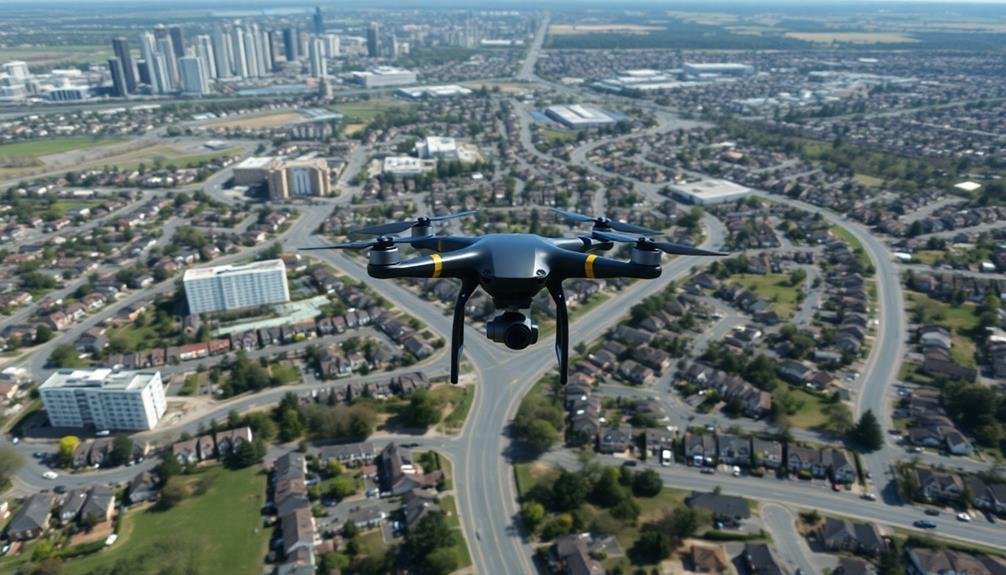
The location of a property can make or break the ease of filming, directly impacting real estate video pricing. You'll find that urban settings often present unique challenges, like limited parking and noise pollution, which can increase costs.
On the other hand, rural properties might require longer travel times and specialized equipment for rough terrain.
Accessibility is another significant factor. Properties with easy access allow videographers to work efficiently, potentially lowering costs. However, if a location is difficult to reach or requires special permissions, you can expect higher prices.
Consider these accessibility factors:
- Parking availability and restrictions
- Elevator access for multi-story buildings
- Gated communities or secured entrances
- Terrain difficulty (e.g., steep driveways, uneven landscapes)
Weather conditions at the location also play a role. Areas prone to sudden weather changes may require rescheduling or additional equipment, affecting the final price.
Additionally, properties in high-demand areas might come with premium rates due to increased competition among real estate professionals. When budgeting for your video, always factor in the property's location and how easily the videographer can access and navigate the site.
Shooting Duration
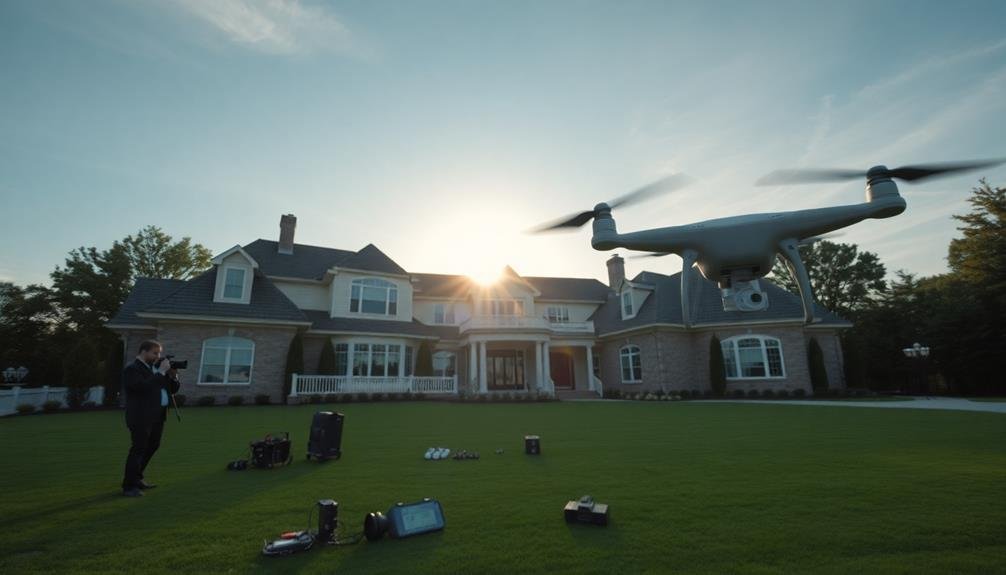
Just as a property's location influences video pricing, the time spent capturing footage is a key cost determinant. The shooting duration directly impacts the videographer's time investment and the resources required for the project. You'll find that longer shoots typically result in higher costs.
Several factors affect the shooting duration. The size of the property is a primary consideration; larger homes or estates naturally require more time to film thoroughly. The number of unique features or selling points you want to highlight will also extend the shoot.
If you're aiming for a more elaborate production with multiple camera angles, drone footage, or specialized lighting setups, expect the duration to increase considerably.
The videographer's experience and efficiency play a role too. Seasoned professionals might work faster, potentially reducing costs. However, they may also take more time to guarantee higher quality results.
You should also consider whether you want to include lifestyle shots or staged scenes, which can add considerable time to the shoot.
Equipment Quality
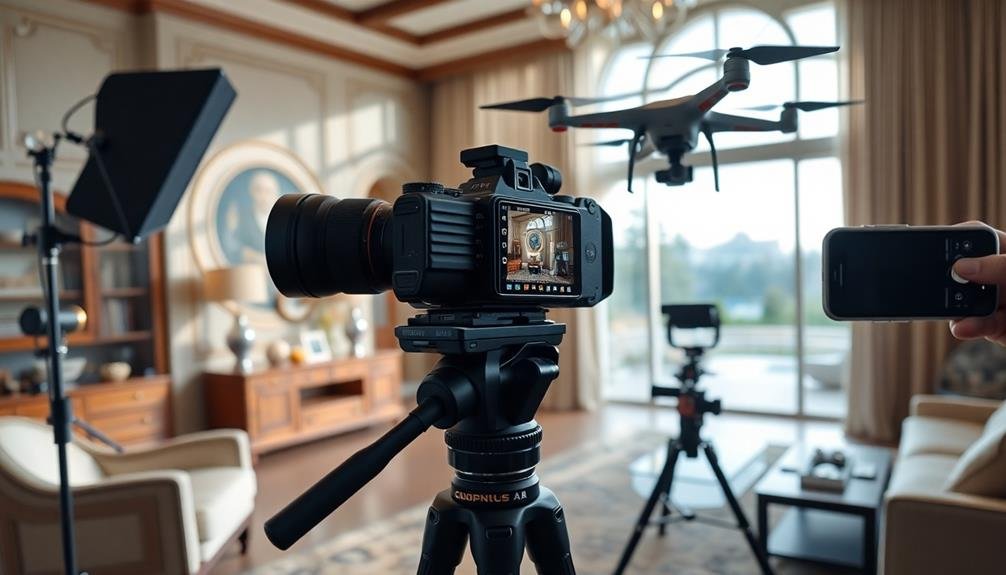
When considering equipment quality for real estate videos, you'll find a significant range between high-end and budget gear options.
Your choice of camera and lens will greatly impact the final product's visual appeal, with professional-grade equipment typically yielding superior results.
Don't overlook the importance of proper lighting and audio equipment, as these elements can elevate your video's overall quality and professionalism.
High-End vs. Budget Gear
Equipment quality plays a significant role in real estate video pricing. When you're comparing high-end gear to budget options, you'll notice substantial differences in both cost and output. High-end equipment, such as professional-grade cameras, lenses, and stabilizers, can produce stunning, cinematic-quality footage that showcases properties in their best light.
However, this gear comes with a hefty price tag that videographers must factor into their rates.
On the other hand, budget gear may be more affordable but often lacks the advanced features and image quality of high-end equipment. This can result in less impressive footage, potentially impacting the property's perceived value.
When choosing between high-end and budget gear, consider:
- Image quality and resolution
- Low-light performance
- Stabilization capabilities
- Audio recording quality
While budget gear can produce acceptable results for some projects, high-end equipment is often necessary for luxury properties or highly competitive markets.
The choice between high-end and budget gear directly impacts the final product's quality and, consequently, the pricing of real estate video services. As a client, you'll need to weigh the benefits of superior footage against the higher costs associated with using top-tier equipment.
Camera and Lens Options
The quality of cameras and lenses sits at the heart of real estate video production. When you're hiring a videographer, you'll find that their equipment choices greatly impact both the final product and the price you'll pay.
High-end cameras, like RED or ARRI systems, capture stunning 4K or even 8K footage with exceptional color depth and dynamic range. These systems allow for more flexibility in post-production and deliver cinema-quality results. However, they come with a hefty price tag that's reflected in the service cost.
Mid-range options, such as Sony or Canon mirrorless cameras, offer excellent image quality at a more accessible price point. They're versatile and capable of producing professional-looking videos for most real estate needs.
Lenses are equally important. Prime lenses with wide apertures can create a shallow depth of field, ideal for highlighting specific features of a property.
Wide-angle lenses are essential for capturing spacious interiors and expansive exteriors. Zoom lenses offer flexibility but may sacrifice some image quality compared to primes.
Lighting and Audio Equipment
While cameras and lenses capture the visuals, lighting and audio equipment play an essential role in creating a polished real estate video. High-quality lighting setups can dramatically enhance a property's appearance, highlighting its best features and creating an inviting atmosphere.
Professional-grade lights, such as LED panels or softboxes, allow videographers to control shadows and illuminate dark spaces effectively.
Audio equipment is equally important, as clear sound can make or break a viewer's experience. Lavalier microphones, shotgun mics, and wireless systems guarantee crisp dialogue and minimize background noise.
The quality of this gear directly impacts the final product's professionalism and can greatly influence pricing.
When considering real estate video services, you'll often find that higher-end equipment comes with a steeper price tag. However, the investment can result in:
- More flattering property presentations
- Enhanced mood and ambiance in each room
- Clearer narration and property descriptions
- Reduced post-production time and costs
Editing Time and Skill

Editing time and skill considerably impact the cost of your real estate video.
The complexity of your footage, including multiple camera angles and special effects, will require more time and expertise to edit effectively.
Your editor's proficiency with advanced software and their ability to make revisions and refinements will also factor into the final price of your video project.
Complexity of Footage
Three key factors influence the complexity of real estate video footage: property size, architectural intricacy, and desired special effects. Larger properties require more time to capture and edit, increasing the overall complexity.
Intricate architectural details demand careful shooting and post-production to highlight unique features, further adding to the complexity.
When it comes to special effects, you'll find that they can greatly impact the complexity of your real estate video. Some common effects that increase complexity include:
- Aerial drone shots for expansive property views
- Time-lapse sequences to showcase day-to-night shifts
- Virtual staging to present potential room layouts
- 3D floor plan animations for a thorough property overview
The more complex your footage, the more time and skill it'll take to produce a polished final product.
You'll need to contemplate the balance between showcasing your property's best features and keeping production costs manageable.
Remember, while complex footage can create a stunning visual experience, it's crucial to focus on elements that truly enhance your property's appeal.
Software and Expertise
How does software and expertise impact real estate video pricing? The editing process is an essential factor in determining the cost of your real estate video. Advanced software and editing skills can notably enhance the final product, but they come at a price.
Professional editors use high-end software like Adobe Premiere Pro or Final Cut Pro, which require substantial investment and expertise. These tools allow for sophisticated color grading, smooth changes, and special effects that can make your property stand out. However, mastering these programs takes time and practice.
Here's a breakdown of how software and expertise affect pricing:
| Software Level | Expertise Level | Editing Time | Price Impact |
|---|---|---|---|
| Basic | Beginner | Minimal | Low |
| Intermediate | Proficient | Moderate | Medium |
| Advanced | Expert | Extensive | High |
| Professional | Master | thorough | Premium |
The more complex your video requirements, the more time and skill it'll take to edit. This includes adding music, voice-overs, text overlays, and 3D floor plans. Remember, you're not just paying for the software, but for the editor's time, creativity, and expertise in using these tools effectively to showcase your property.
Revisions and Refinements
Numerous revisions and refinements can greatly impact the final cost of your real estate video. The editing process is often time-consuming and requires significant skill, especially when you're aiming for a polished, professional result. As you request changes or additional features, you'll likely see the price increase accordingly.
Consider the complexity of your desired edits when budgeting for your video. Simple tweaks like adjusting color grading or trimming clip lengths may be relatively quick, but more intricate tasks can add substantial time and cost. These might include:
- Adding custom animations or motion graphics
- Incorporating drone footage seamlessly
- Syncing music perfectly with visual shifts
- Creating sophisticated special effects
Remember that each round of revisions extends the project timeline and increases the editor's workload. Skilled editors command higher rates for their expertise in crafting compelling narratives and visually stunning sequences. They'll invest time in fine-tuning every aspect of your video, from pacing to audio mixing.
To keep costs manageable, provide clear feedback and try to consolidate your revision requests. By understanding the time and skill involved in the editing process, you'll be better equipped to navigate pricing discussions with your video production team.
Aerial Footage Requirements
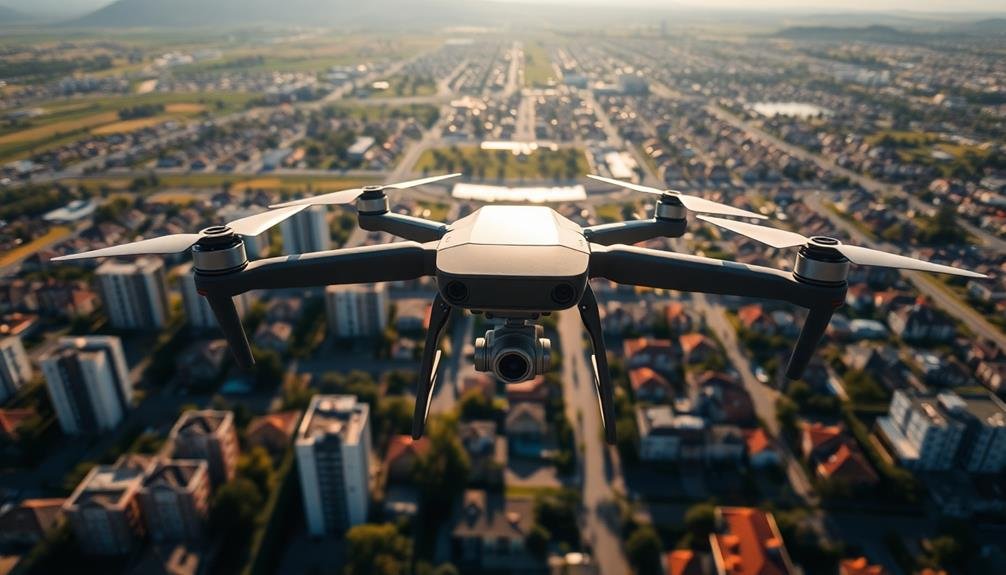
Aerial footage has become an important component of real estate videos, offering a unique perspective that can greatly enhance property listings. When considering aerial shots for your real estate video, you'll need to factor in several requirements that can impact the overall cost.
First, confirm your videographer has the necessary FAA certifications to operate drones legally. This includes a Part 107 license and proper insurance coverage. Weather conditions also play a vital role in aerial filming, as wind, rain, or extreme temperatures can ground flights and delay production.
Consider the property's location and any airspace restrictions that may apply. Some areas require special permits or have no-fly zones, which can increase complexity and cost.
| Requirement | Impact | Cost Factor |
|---|---|---|
| FAA Certification | Legal compliance | Moderate |
| Weather Conditions | Scheduling flexibility | Low to High |
| Airspace Restrictions | Permit acquisition | Moderate to High |
| Equipment Quality | Image resolution | Moderate to High |
| Piloting Skill | Shot complexity | Low to High |
The quality of the drone and its camera will affect the final output. Higher-end equipment can capture smoother, more professional-looking footage but comes at a premium. Finally, the pilot's skill level determines the complexity of shots achievable, potentially influencing the video's overall impact and cost.
Licensing and Permits
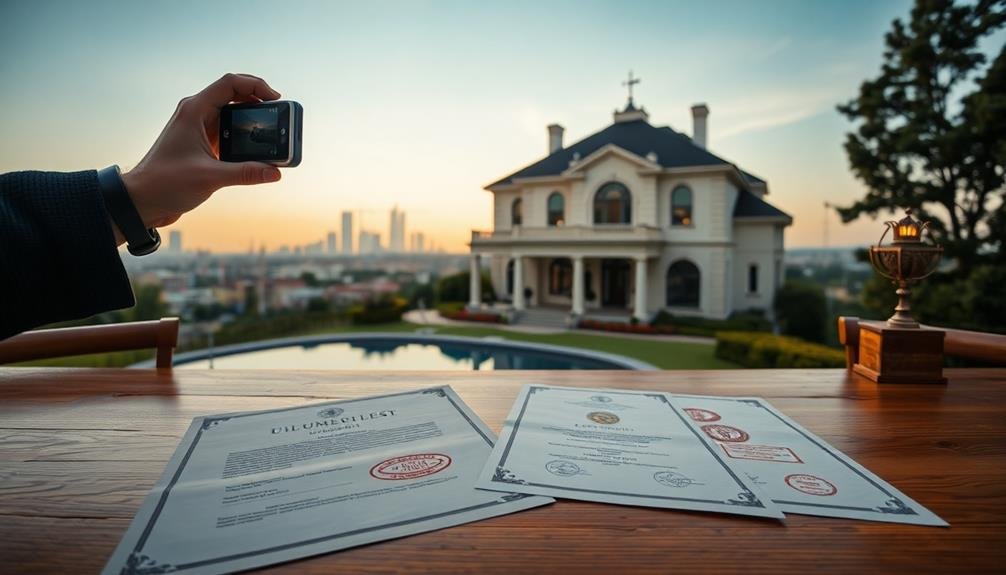
When it comes to real estate video production, licensing and permits are vital aspects you can't afford to overlook. These requirements can greatly impact your project's cost and timeline.
You'll need to research and obtain the necessary permissions before shooting, especially when filming in public spaces or using drones. Different locations have varying regulations, so you must familiarize yourself with local laws. Some areas require specific permits for commercial filming, while others may have restrictions on drone usage.
You'll also need to take into account music licensing if you're planning to use copyrighted tracks in your video.
Here are some key licensing and permit considerations:
- FAA certification for drone operators
- Property release forms for private locations
- City or county filming permits
- Music licensing for background tracks
Obtaining these licenses and permits often involves fees, which will be factored into your overall production costs. Additionally, the time required to secure these permissions can affect your project timeline.
It's vital to budget for these expenses and plan accordingly to avoid delays or legal issues. Remember, compliance with regulations not only protects you legally but also guarantees a smooth production process.
Videographer's Experience
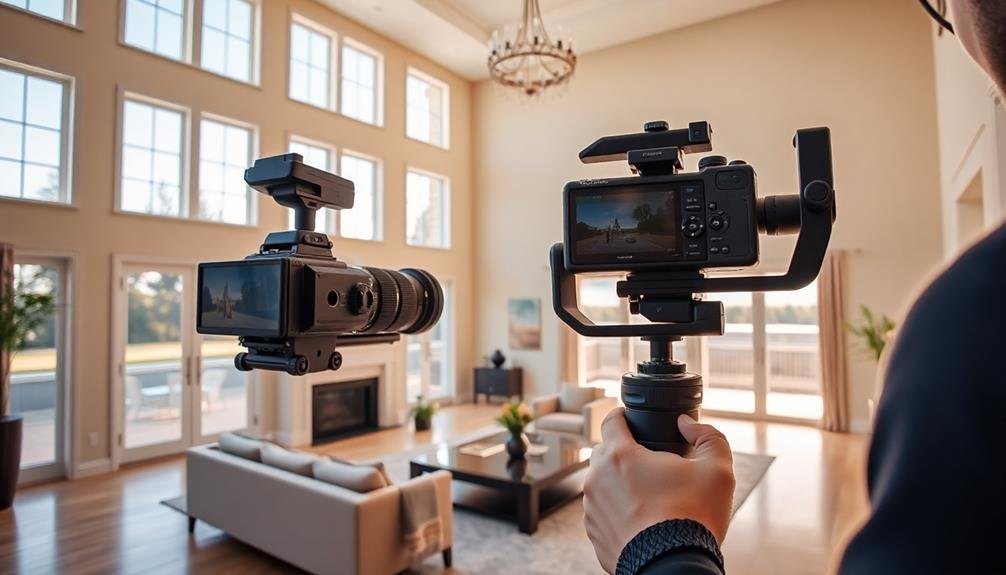
When choosing a real estate videographer, you'll find that their experience considerably affects pricing.
A videographer's skill level, honed through years of practice and projects, directly impacts the quality and cost of their work.
You can gauge their expertise by reviewing their portfolio, which showcases their best projects and demonstrates their ability to capture properties effectively.
Skill Level Impacts Cost
A videographer's expertise plays a pivotal role in determining real estate video pricing. As you explore options for your property's video, you'll find that skilled professionals command higher rates. These experts bring a wealth of knowledge in composition, lighting, and editing techniques that can greatly enhance your listing's appeal.
Highly skilled videographers often invest in advanced equipment and software, allowing them to create polished, cinematic-quality videos. They're adept at showcasing your property's best features and can effectively tell its story through visual means. Their experience enables them to work efficiently, potentially saving you time and ensuring a smoother production process.
Consider these factors when evaluating a videographer's skill level:
- Years of experience in real estate videography
- Portfolio quality and diversity
- Technical proficiency with various camera systems and editing software
- Understanding of current real estate market trends and buyer preferences
While it's tempting to opt for lower-cost options, remember that a skilled videographer's work can greatly impact your property's marketability. Their ability to create compelling visual content may justify the higher price tag, potentially leading to quicker sales and better offers.
Portfolio Demonstrates Expertise
A videographer's portfolio serves as a window into their expertise and style. When you're evaluating real estate videographers, their portfolio is an essential factor in determining their pricing. A robust portfolio showcases a range of properties, demonstrating versatility and adaptability to different architectural styles and landscapes.
Look for high-quality footage, smooth changes, and creative angles that highlight a property's best features. Experienced videographers will have mastered techniques like drone photography, time-lapse sequences, and twilight shots. They'll also display proficiency in post-production, including color grading and audio mixing.
Videographers with impressive portfolios often command higher rates because they've proven their ability to deliver premium results consistently. They've likely invested in high-quality equipment and software, further justifying their pricing.
When reviewing portfolios, pay attention to the types of properties featured. If a videographer has experience with luxury homes or commercial properties similar to yours, they may be better equipped to meet your specific needs.
Post-Production Effects
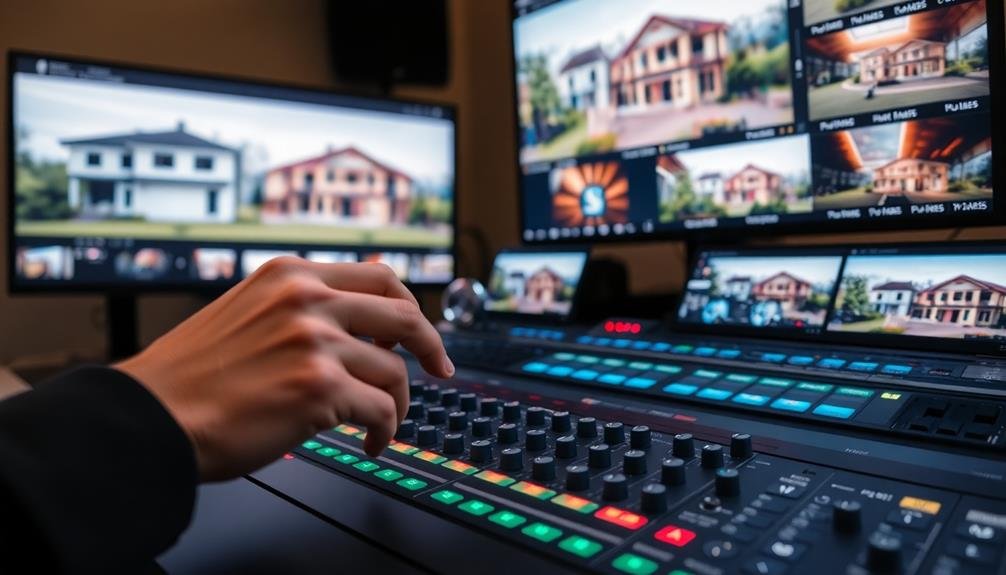
Post-production effects can greatly impact the final cost of your real estate video. These effects enhance the visual appeal and professionalism of your footage, but they require time, skill, and specialized software. As you consider your video's budget, remember that more complex post-production work will increase the overall price.
Some common post-production effects include color grading, which adjusts the video's tone and mood, and stabilization, which smooths out shaky footage. You might also want to add text overlays, changes between scenes, or even 3D floor plans. Each of these elements adds to the production time and, consequently, the cost.
Consider these factors when discussing post-production with your videographer:
- Complexity of effects desired
- Number of scenes or clips requiring editing
- Need for custom graphics or animations
- Time constraints for project completion
The level of post-production you choose can greatly influence your video's final look and feel. While basic editing might suffice for some properties, luxury or high-end listings often benefit from more advanced post-production work.
Discuss your vision and budget with your videographer to find the right balance between cost and quality.
Turnaround Time
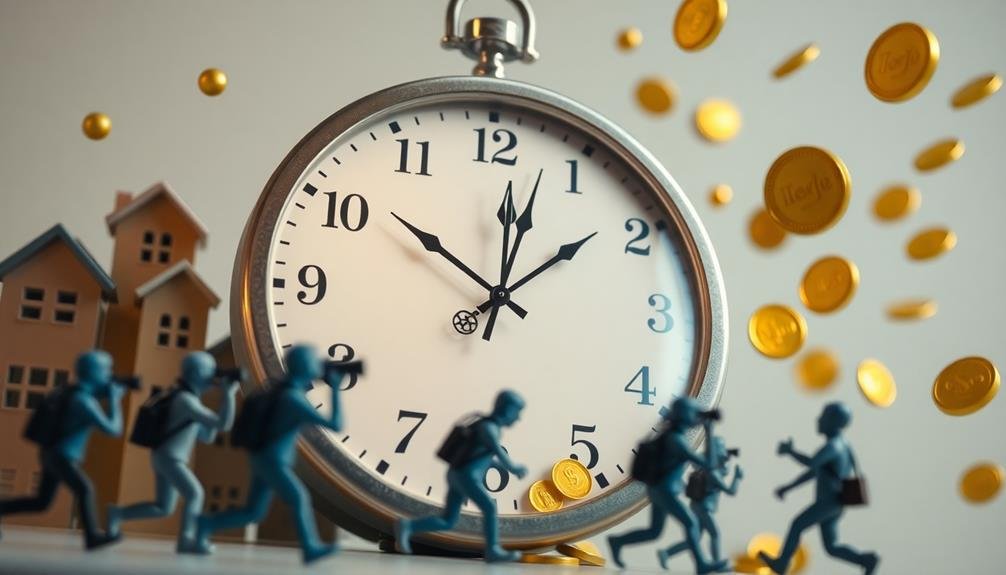
Turnaround time plays a notable role in real estate video pricing. When you need your video quickly, you'll likely pay a premium for expedited service.
Standard turnaround times typically range from 3-5 business days, but some videographers offer faster options at higher rates.
Rush orders can notably impact pricing, with same-day or next-day delivery often costing 50-100% more than standard rates. This increased cost reflects the videographer's need to prioritize your project over others, potentially working overtime or rescheduling other commitments.
Consider your listing timeline when deciding on turnaround time. If you're in a competitive market or have a hot property, faster delivery might be worth the extra cost. However, if you have flexibility, opting for standard turnaround times can save you money.
Some videographers offer tiered pricing based on delivery speed. You might see options like "economy" (5-7 days), "standard" (3-5 days), and "rush" (1-2 days).
Each tier comes with a different price point, allowing you to balance your budget and timing needs effectively.
Seasonal Demand

Real estate video pricing fluctuates throughout the year due to seasonal demand. You'll notice that prices tend to rise during peak selling seasons, typically spring and early summer. During these busy times, real estate professionals are keen to showcase properties, leading to increased demand for video services.
Conversely, you might find better deals during slower periods, like winter or late fall. Understanding seasonal trends can help you plan your video needs more effectively:
- Spring surge: Prices may increase as the market heats up
- Summer stability: Demand often remains high, keeping prices elevated
- Fall fluctuations: Prices may start to dip as the market cools
- Winter lull: You might find the best deals during this slower season
Keep in mind that local market conditions can affect these patterns. In areas with year-round appeal, like tropical destinations or ski resorts, seasonal fluctuations might be less pronounced.
Additionally, unexpected events or economic shifts can disrupt typical seasonal trends. By staying aware of these patterns, you can make informed decisions about when to invest in real estate videos, potentially saving money or securing premium services at advantageous times.
Client Customization Requests
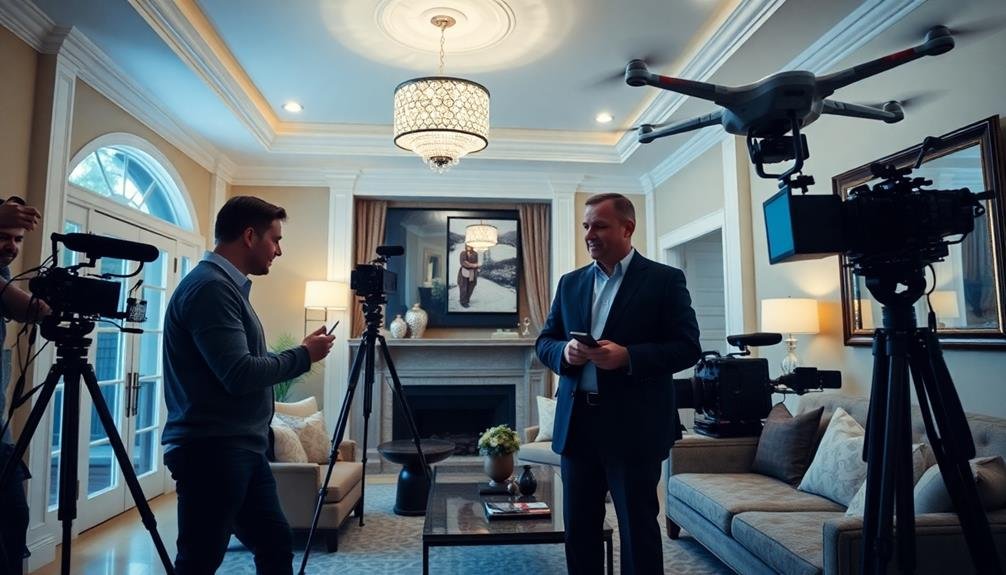
Client customization requests can greatly impact the pricing of real estate videos. When you ask for specific features or modifications, you're adding complexity to the project, which often translates to higher costs.
Common customizations include aerial drone footage, twilight shots, or elaborate staging setups. These elements require additional equipment, time, and expertise.
If you're looking for a unique narrative structure or voice-over, you'll likely pay more for scriptwriting and professional narration. Custom music selections or licensed tracks can also drive up the price.
Advanced editing techniques, such as time-lapses or 3D floor plan animations, will increase the post-production time and costs.
Remember that the more detailed your requests, the more time the videographer needs to spend planning, shooting, and editing. This extra effort is reflected in the final price.
However, customizations can remarkably enhance the video's appeal and effectiveness in marketing your property. When considering customizations, weigh the potential return on investment against the additional costs.
Discuss your ideas with the videographer early in the process to get accurate pricing and guarantee they can meet your expectations within your budget.
Travel Expenses

Depending on the location of your property, travel expenses can greatly impact the overall cost of your real estate video. Videographers may need to factor in costs for fuel, accommodation, and meals when traveling to distant locations. These expenses are typically passed on to you, the client, as part of the overall pricing structure.
Consider the following factors that can influence travel expenses:
- Distance from the videographer's base of operations
- Accessibility of the property (e.g., remote locations or areas with limited transportation options)
- Duration of the shoot, which may require overnight stays
- Equipment transportation costs, especially for larger or specialized gear
To minimize travel expenses, you might consider hiring a local videographer or one who's based closer to your property. However, keep in mind that choosing a professional solely based on proximity may compromise the quality of your video.
Balance the potential savings in travel costs against the expertise and portfolio of the videographer you're considering.
Some videographers may offer package deals that include travel expenses for certain regions or distances. It's worth discussing these options when requesting quotes to guarantee you're getting the best value for your real estate video production.
Market Competition
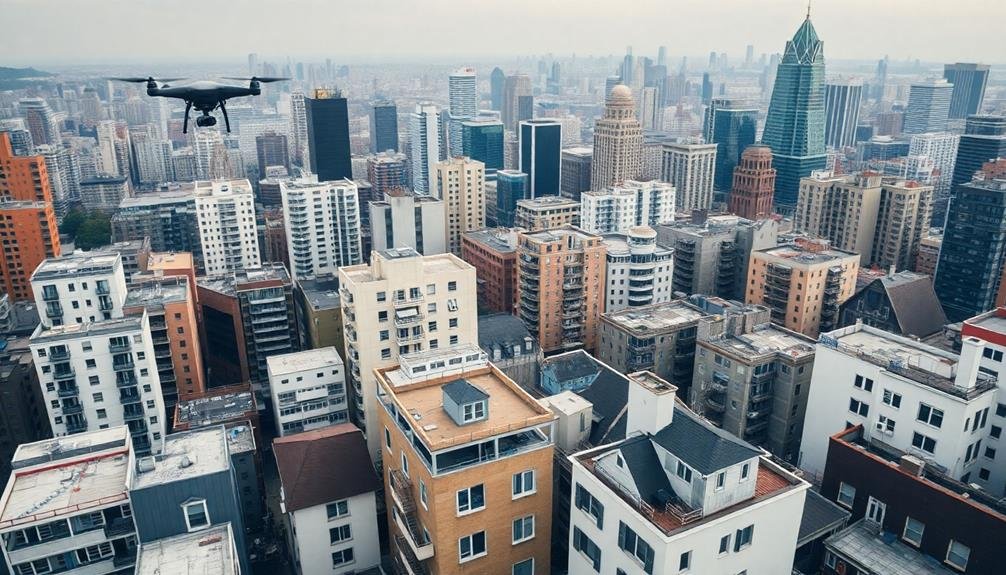
Market competition plays a vital role in determining real estate video pricing. When you're looking to hire a videographer for your property, you'll find that prices can vary greatly based on the level of competition in your area. In markets with many skilled videographers, you might benefit from more competitive pricing as professionals vie for your business.
However, don't assume that a saturated market always means lower prices. In some cases, high-end videographers may maintain premium rates due to their reputation and quality of work. You'll need to balance cost with the level of expertise you require for your property.
In less competitive markets, you may face higher prices due to limited options. If there are few videographers specializing in real estate, they can often command higher rates. You might need to weigh the cost against the potential benefits of professional video marketing for your property.
Consider researching nearby markets if local options are limited or overpriced. Some videographers may be willing to travel, potentially offering you better rates or higher quality work than what's available locally.
Always compare multiple quotes and portfolios to guarantee you're getting the best value for your investment.
Frequently Asked Questions
Do Real Estate Videos Increase Property Sales?
Yes, real estate videos can boost your property sales. They'll give potential buyers a better feel for the home, showcase its best features, and increase engagement. You'll likely attract more serious buyers and potentially sell faster.
How Long Does a Typical Real Estate Video Remain Relevant?
You'll find that a typical real estate video's relevance can vary. It often remains useful for 3-6 months, but it depends on market conditions, property updates, and seasonal changes. You should refresh your video if significant changes occur.
Can I Use the Same Video for Multiple Listing Platforms?
You can use the same video across multiple listing platforms. It's efficient and cost-effective. Just verify you have the rights to do so and that the video meets each platform's specifications for format and size.
Are There Any Legal Considerations When Featuring People in Real Estate Videos?
Yes, there are legal considerations when featuring people in real estate videos. You'll need to obtain written consent from anyone appearing in your video. Additionally, you should respect privacy laws and avoid capturing unwanted individuals or neighbors.
How Do Virtual Tours Compare to Traditional Video Tours in Terms of Effectiveness?
Virtual tours offer 24/7 accessibility and interactive features, allowing you to explore at your own pace. They're often more cost-effective and convenient than traditional video tours. However, traditional tours can provide a more personal, guided experience.
In Summary
You've seen the many factors that influence real estate video pricing. From property size to market competition, each element plays a role in determining the final cost. Remember, you're not just paying for a video; you're investing in a powerful marketing tool. When you're shopping for a videographer, consider these factors and don't hesitate to ask questions. By understanding what goes into pricing, you'll make a more informed decision for your property's promotional needs.
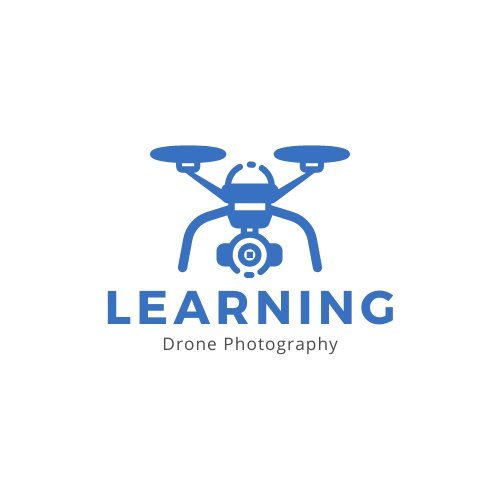
As educators and advocates for responsible drone use, we’re committed to sharing our knowledge and expertise with aspiring aerial photographers.

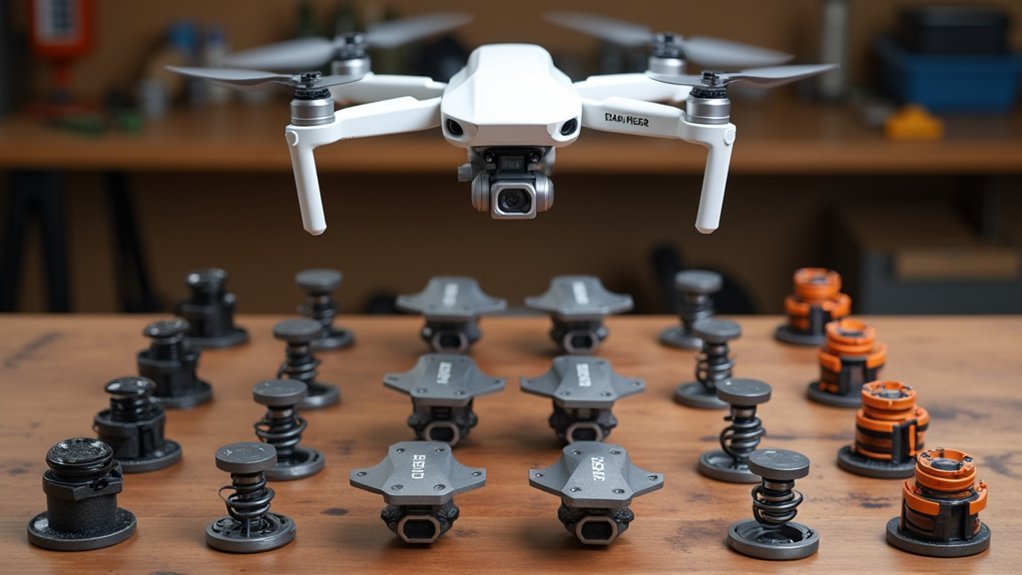
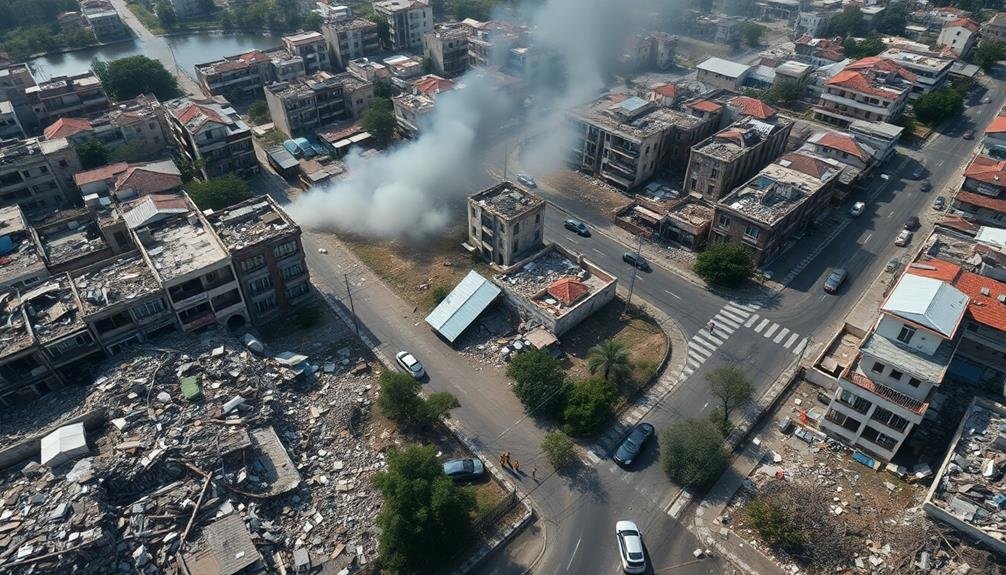
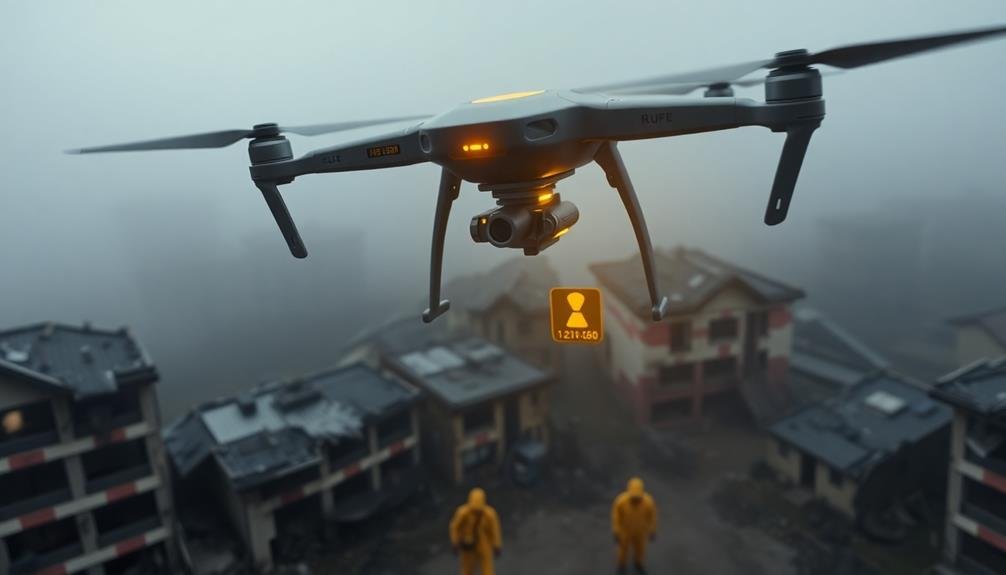
Leave a Reply